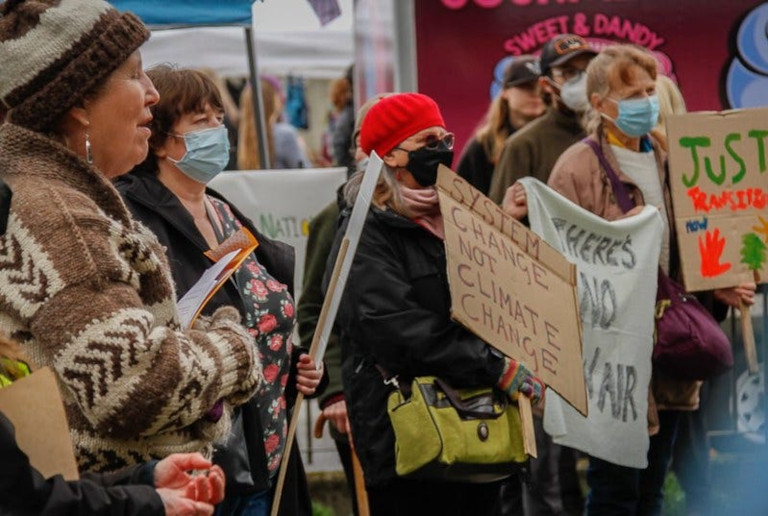There was an article in Nature from late 2022 on degrowth that got some sudden attention over the holidays because economists and tech bros noticed it and turned out on social media to do some hating. In fact the lead author, Jason Hickel, claimed on Ex-Twitter that as a result the paper was the most-read on Nature during the break.
Regular readers here will know that my main issue with the idea of “degrowth” is the name—that if you’re trying to change behaviour around an idea that is deeply culturally embedded in 250 years of modernity, it’s best (a) not to do it head-on, and (b) not to frame it as a negative. But I’ll park that for now.
The short paper, which is outside of the Nature paywall, has an impressive collection of authors. The ones whose work I know include Hickel, Tim Jackson, Giorgos Kallis, Juliet Schor, and Juliet Steinberger (whom I mentioned on Just Two Things last year).
Five principles
They argue that there are five principles that a “degrowth society” needs to be organised around:
- Reduce less-necessary production
- Improve public services
- Introduce a green jobs guarantee
- Reduce working time, and
- Enable sustainable development.
I’m to work through these briefly, to explain the thinking that sits behind each.
1. Reduce less-necessary production
This is about
scaling down destructive sectors such as fossil fuels, mass-produced meat and dairy, fast fashion, advertising, cars and aviation, including private jets. At the same time, there is a need to end the planned obsolescence of products, lengthen their lifespans and reduce the purchasing power of the rich.
I’m assuming the point about the rich is because of their lopsided impact on emissions. But there’s a bit more to it. There’s a whole lot of corporate governance changes that are also needed to reduce the way that growth is baked into corporate behaviour:
For example, the ‘fiduciary duty’ of company directors needs to be changed. Instead of prioritizing the short-term financial interests of shareholders, companies should prioritize social and environmental benefits and take social and ecological costs into account.
And a bit more again: we’ll also need macro-economic models that don’t just focus on GDP but allow policy makers to balance multiple objectives—economic, financial, social and ecological. These do exist, but are typically single country models.
2. Improve public services
This is because good quality public services can deliver a good quality of life that is coupled with lower resource use. Buses are a more sustainable transport solution than private cars, for example.
This will also require different forms of financing:
Governments must stop subsidies for fossil-fuel extraction. They should tax ecologically damaging industries such as air travel and meat production. Wealth taxes can also be used to increase public resources and reduce inequality.
Governments that issue their own currencies can use these as a mechanism for this, as they did to bail out the banks in 2008 and pay for furloughed workers in 2020. The researchers don’t mention this, but where governments are investing in green infrastructure this typically has revenue streams attached to it, so can be separated out from current expenditure—and represents an attractive investment for long-term investors such as pension funds.
3. Green jobs guarantee
This would train and mobilize labour around urgent social and ecological objectives, such as installing renewables, insulating buildings, regenerating ecosystems and improving social care. A programme of this type would end unemployment and ensure a just transition out of jobs for workers in declining industries or ‘sunset sectors’, such as those contingent on fossil fuels.
The article suggests that some kind of basic income guarantee might be part of this, but I’d suggest that a “good jobs guarantee” is more important. I contributed to some work with the British Trades Union Congress on this a few years ago (the report they published is here).
One of the critical issues in the room was that jobs in the oil and gas sectors were well-paid, skilled, and unionised (these three facts are connected) but many of the emerging jobs in the renewables sector were not. The trades unionists in the room were pretty clear that they weren’t going to voluntarily swap well-paid and unionised work for poorly-paid non-unionised work. And given that well-paid skilled work drives productivity, why should they?

4. Reduce working time
I’ve written about this here before, but the summary in the article is about
lowering the retirement age, encouraging part-time working or adopting a four-day working week. These measures would lower carbon emissions and free people to engage in care and other welfare-improving activities.
Although the trials of shorter working weeks have been positive, there are some areas we need to understand better. For example, the researchers suggest we need to understand the barriers to introducing shorter working weeks. (In the UK this includes bone-headed Conservative ministers trying to score political points in an over-centralised state).
We also need to understand the relationship between working hours and emissions better:
Although less commuting lowers energy use and carbon emissions during compressed work weeks, behaviours during three-day weekends remain underexplored. More travel or shopping during free time could increase emissions.
5. Enable sustainable development
This has both an international and a national/local aspect to it:
(C)ancelling unfair and unpayable debts of low- and middle-income countries, curbing unequal exchange in international trade and creating conditions for productive capacity to be reoriented towards achieving social objectives.
There’s a whole area of analysis around the idea of “systems of provision”—I may come back to this in Just Two Things another time—which looks at the whole system around the way a public or social objective, or an economic outcome, is delivered, linking both socio-technical systems perspectives and systems of political economy. The researchers mention housing in the Nature paper:
In many parts of the world, property markets cater to developers, landlords and financiers. This contributes to segregation and inequality, and can push working people out of city centres so they are dependent on cars, which increases fossil-fuel emissions. Alternative approaches include public or cooperative housing, and a financial system that prioritizes housing as a basic need.
The politics of this
As I said at the start, one of the problems of “degrowth” is that it includes the word “growth” in it. It’s unhelpful: this is really a discussion about quality of life and productivity—ways to be able to live well while doing less, including working less. It’s not as if the current model is working well at the moment, but as soon as you mention the word “growth” it evokes uncritically all of the dominant ideas of modernity.
And people who have uncritical views of what “growth” involves haven’t really thought through the impact on our economies of climate change, resources depletion, poor soil quality, biodiversity loss, etc. In the Limits to Growth model review in 2005, the base case, which has been tracking actual outcomes too well for too long to be a coincidence, leads to industrial decline in the 2020s and population decline in the 2030s. (And no: the systems research says that technology can’t fix this in the time we have.)
So at one level, the choice we have is whether we manage growth down gently, and improve wellbeing outcomes at the same time, or just have it come crashing down around us. The people who responded to Jason Hickel’s tweets by asking him if he agreed that growth led to technology development were looking through the wrong end of the telescope.
The good news is that there’s some evidence that public attitudes are changing: they may be ahead of politicians:
Polls in Europe show that the majority of people prioritize well-being and ecological objectives over growth (see go.nature.com/3ugg8kt). Polls in the United States and the United Kingdom show support for job guarantees and working-time reductions (see go.nature.com/3uyhdjv and go.nature.com/3y8ujz5).
One of the articles that Hickel linked to suggested that climate policy researchers in the global North are increasingly aligned around degrowth or what’s known as ‘a-growth’—agnostic about growth, except in terms of its broader social and environmental effects—rather than green growth.

Teemu Kosimaki (2023)
For some reason, this whole discussion reminds me of the famous cartoon about dealing with climate change. Because: All of these five principles are a more equitable, more inclusive, and more effective way of organising the way we live and work.





